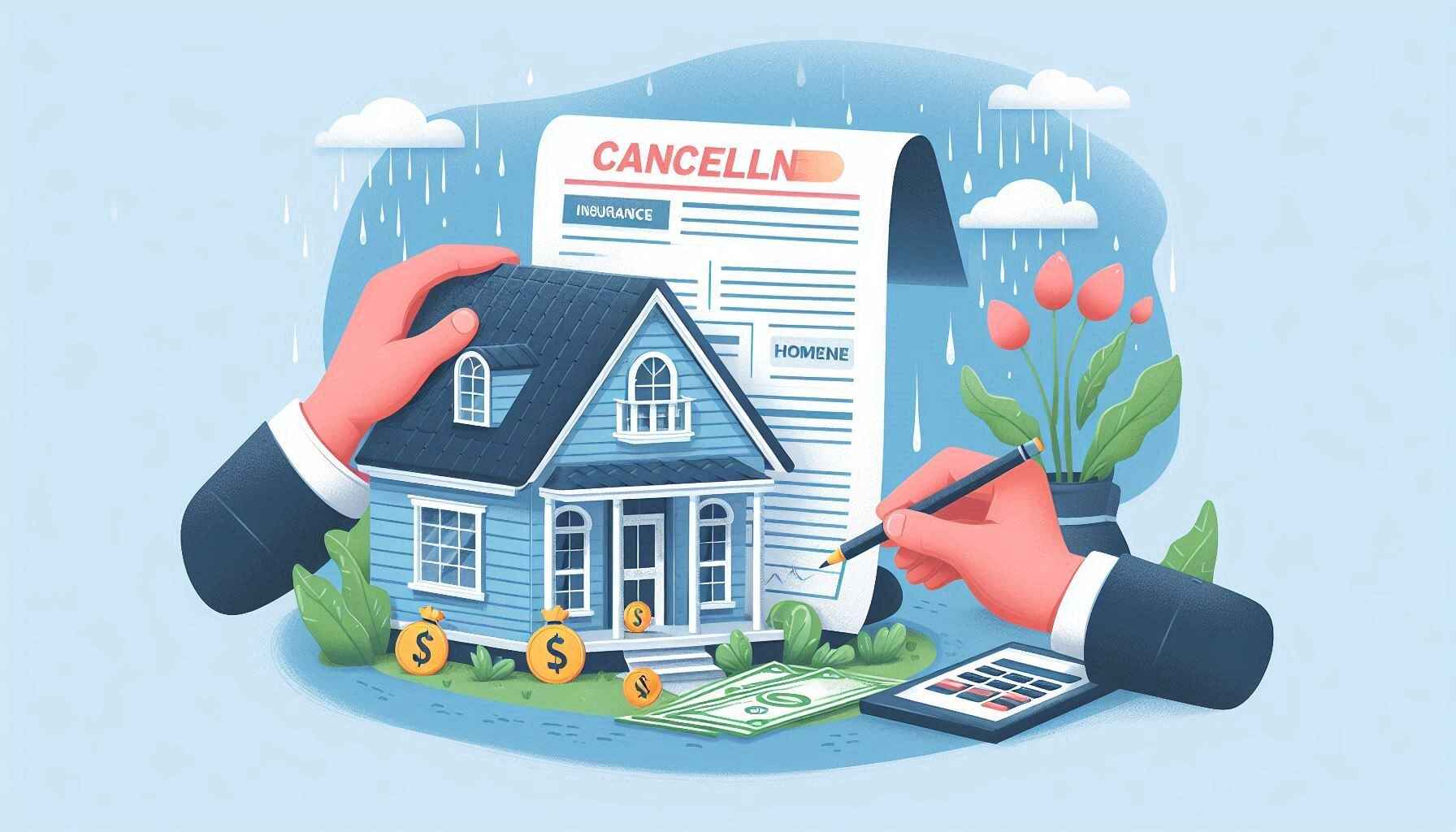Introduction: Understanding Home Insurance Terminations
Receiving a home insurance cancellation letter can be concerning, especially when you didn’t request any changes. Insurance policies are generally built to protect you and your property, so a sudden termination notice might seem confusing. This guide aims to clarify why such notices might be sent, how different types of policy terminations work, and what steps you can take if you receive a cancellation letter.

Why You Might Receive a Cancellation Letter
There are a few reasons why your home insurance received cancellation letter but they never cancelled the policy. Here are some common scenarios:
1. Administrative Errors
- Insurance companies handle vast amounts of data. Sometimes, an error in the system can mistakenly generate a cancellation notice. This is one of the most common reasons and can often be resolved with a quick call to customer service.
2. Payment Processing Delays
- Payments may be delayed due to banking issues, and the insurer might not see the payment on time. This can trigger an automatic cancellation notice. If the payment was made but not processed correctly, providing proof of payment can resolve the issue.
3. Changes in Risk Assessment
- Your home insurance provider may have reviewed your risk profile and reassessed your policy. They may initially send a cancellation letter if they need additional information from you, such as details on recent home renovations, pet additions, or other significant changes that impact the risk they’re covering.
4. Outdated Policy Information
- Sometimes, outdated contact or policyholder information can lead to administrative missteps. Ensure all personal information, including contact details and policy updates, are current to avoid accidental notices.
5. Company Policy Changes
- Some insurers periodically reevaluate their coverage areas or client risk factors and may issue cancellation notices based on new policies. However, they may also provide options to modify the policy to maintain coverage.
Understanding the reasons behind an unexpected cancellation letter can help you navigate the next steps effectively.
Types of Home Insurance Terminations
There are several types of policy terminations in home insurance. Knowing the difference between them can help you clarify your situation.
1. Lapse in Payment
- When premiums aren’t paid on time, coverage can lapse. However, most insurance companies provide a grace period before the policy officially terminates, giving policyholders a chance to make the payment and avoid cancellation.
2. Nonrenewal
- Nonrenewal occurs when the insurance company decides not to renew your policy after its current term ends. This could be due to a high-risk claim history or changes in company underwriting guidelines.
3. Involuntary Cancellation
- When an insurer cancels a policy before the end of its term, this is often due to reasons such as fraud, non-disclosure of vital information, or high-risk modifications made to the property.
Recognizing which type of termination your letter refers to can clarify your standing with the insurer. If your home insurance received cancellation letter but they never cancelled the policy, it’s essential to verify the exact reason.
Read More:
- How to Email Cancellation Home Insurance Mentioning Reason
- Home Insurance Claim Adjuster Secret Tactics: 10 Tips to Maximize Your Payout
Steps to Take if You Receive a Cancellation Letter
If you’ve received a home insurance cancellation letter but no official cancellation followed, here are steps to take for clarification and protection.
1. Review the Cancellation Letter Carefully
- Check the letter for any specifics regarding the reason for the potential cancellation. Note any dates, deadlines, and actions required on your part, such as providing documentation or updating information.
2. Verify Payment Status
- Double-check your payment records to ensure no lapses or missed payments occurred. If you’ve made the payment, verify that it was processed on time by your bank or credit card company.
3. Contact Your Insurance Provider
- A quick call to your insurance company can resolve many issues. Customer service representatives can check for any errors, confirm your payment status, and give you peace of mind if the cancellation letter was sent by mistake.
4. Keep Records of Communication
- Document all conversations, emails, and payment records with the insurance provider. This helps to establish a paper trail in case the issue recurs or if you need to escalate the matter.
5. Update Personal and Property Information
- If you have made changes to your home (such as renovations or new safety measures), inform your insurance provider. Up-to-date information can ensure that you’re not flagged as a high risk.
These steps can help you clarify and resolve the matter quickly, avoiding the need for prolonged correspondence.
Understanding Policyholder Rights
In cases where your home insurance received cancellation letter but they never cancelled, it’s essential to know your rights:
- Right to Written Notice: By law, insurers must provide a written notice of cancellation or nonrenewal with clear reasons for their decision. This notice must arrive a specified number of days before the cancellation date, typically 30 days.
- Right to Appeal: If you believe the cancellation or nonrenewal is unfair, you have the right to appeal or request a hearing, depending on state regulations.
- Right to Correct Mistakes: Many states allow policyholders to rectify certain issues, like payment delays or outdated information, to avoid cancellation.
Policyholders can reach out to their state insurance department if they feel the insurer acted improperly.
Errors that May Lead to Incorrect Cancellation Notices
In certain cases, internal errors within an insurance company might trigger a cancellation letter even if you haven’t violated any policy terms. Here are some common examples:
- Duplicate Accounts or Billing Errors: Sometimes, accounts can be duplicated, leading to incorrect billing and eventual cancellation notices.
- Automated System Failures: Technical issues with automated systems may mistakenly label accounts as delinquent.
- Data Entry Errors: Human error can lead to incorrect notices if your information was entered or updated improperly.
In these cases, contacting your insurer and providing supporting documentation often resolves the issue.
Contacting Your Insurer for Clarification
If you’re uncertain why your home insurance received cancellation letter but they never cancelled the policy, a call to your insurance company can clear up confusion.
- Start by Calling Customer Service: Most insurance companies have dedicated customer service teams that handle these issues daily.
- Ask for an Explanation of Any Payment or Policy Issues: Request a detailed explanation if the cancellation was due to a lapse in payment or policy terms.
- Request to Speak with a Supervisor if Necessary: If the customer service representative cannot resolve your issue, don’t hesitate to ask for a manager.
Many insurers are willing to work with policyholders to address and correct any issues that may have led to an unnecessary cancellation letter.

Ways to Prevent Future Cancellation Notices
To avoid receiving unexpected cancellation letters in the future, here are some proactive steps you can take:
- Ensure On-Time Payments: Set up automatic payments or reminders to avoid any lapses.
- Update Personal Information Regularly: Keep your insurance company informed of any address, phone, or email changes.
- Maintain Regular Communication with Your Insurer: Reach out periodically to ensure that all information is up-to-date and accurate.
- Document Policy Changes and Payments: Keeping thorough records can help resolve disputes quickly.
Preventing administrative issues upfront can help maintain the stability of your insurance policy.
What to Do if You Need a New Policy
In the unlikely event that your policy is ultimately canceled, finding new insurance quickly is essential. Here are some options:
- Shop Around for Different Providers: Comparing rates and policies from different insurers can help you find one that meets your needs.
- Consider a FAIR Plan: These government-backed plans provide basic coverage for homeowners unable to obtain insurance on the private market.
- Seek Assistance from an Insurance Agent: Licensed agents can guide you in finding a suitable policy and help address concerns.
Preventing Future Cancellations and Reducing Premiums
Taking steps to prevent future cancellations can help you maintain coverage and keep premiums manageable.
Steps to Stay Ahead of Rising Costs
- Regular Maintenance: Preventive upkeep on your property reduces risks.
- Bundle Policies: Many insurers offer discounts if you combine home and auto insurance.
- Review Your Policy Annually: Review your coverage every year to make sure it still meets your needs.
Finding New Home Insurance Coverage
If your policy is terminated, you’ll need replacement coverage. Here’s what to consider:
Options for High-Risk Homeowners
If you have trouble finding coverage due to prior cancellations, high-risk options like FAIR (Fair Access to Insurance Requirements) plans offer basic policies for those denied traditional insurance. These state-supported plans provide minimum necessary coverage for high-risk homeowners.
Tips for Reapplying and Securing Coverage
- Review Policy Requirements: Understand what each policy covers and the exclusions.
- Work with an Insurance Agent: A professional can help match you with companies specializing in high-risk policies.
- Compare Premiums and Coverage Limits: Be sure to review all aspects of each policy, including coverage limits, exclusions, and deductibles.
Conclusion
Receiving a home insurance cancellation letter doesn’t necessarily mean your policy will end, but it does require attention. By understanding why these notices are sent, how to respond effectively, and ways to secure alternative coverage if needed, you can safeguard your home and financial future. Proactively maintaining your property and being mindful of risk factors can help keep your policy in good standing and ensure you have the protection you need.



Pingback: Can I Refuse a Home Insurance Inspection? - Insurance Home